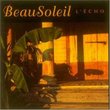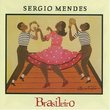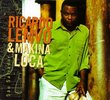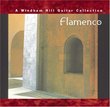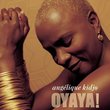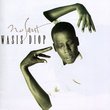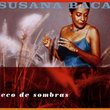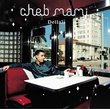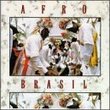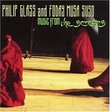| All Artists: Lagbaja Title: We Before Me Members Wishing: 1 Total Copies: 0 Label: Indigedisc Original Release Date: 1/1/2001 Re-Release Date: 6/19/2001 Genres: International Music, Pop Style: Africa Number of Discs: 1 SwapaCD Credits: 1 UPC: 644949500322 |
Search - Lagbaja :: We Before Me
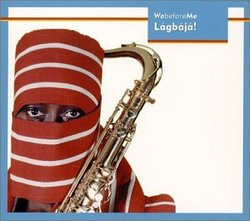 | Lagbaja We Before Me Genres: International Music, Pop
Led by a mysterious masked singer and saxophonist who gives the band their name, Nigeria's Lagbaja mine not only the more traditional sounds of highlife and juju, but add plenty of Afrobeat and '80s funk to the mix. Whi... more » |
Larger Image |
CD DetailsSynopsis
Amazon.com's Best of 2001 Led by a mysterious masked singer and saxophonist who gives the band their name, Nigeria's Lagbaja mine not only the more traditional sounds of highlife and juju, but add plenty of Afrobeat and '80s funk to the mix. While the ghost of the late Fela Kuti looms large (he's sampled on one track), Lagbaja show more homage to American acts like the Gap Band and Roger & Zapp--even borrowing their trademark vocoder vocal sound on "Gra Gra." But the Yoruba influence also speaks strongly, merging with gospel for the powerful and conscious "Prayer for the Youth." Culled from three Nigerian releases, this makes a fascinating crossover introduction to a powerful band, and the politically potent lyrical mix of Yoruba, pidgin, and English increase its accessibility to Western audiences. Think of Lagbaja as future funk, where today meets yesterday in celebration, and you can think and dance at the same time. --Chris Nickson Similarly Requested CDs
|
CD ReviewsLagbaja Immortalizes Yoruba Folk Songs Adewale Adewumi | Palm Coast, FL United States | 12/22/2002 (5 out of 5 stars) "The sound of this masked piper of Yorubaland is nothing short of phenomenal. Adopting a fusion of old and new, Lagbaja reaches way back to the choruses that accompanied folk tales told on moonlit nights in villages and towns throughout Yorubaland in the fifties and sixties. Not only are the songs ancient, they also take on a modern form through Lagbaja's masterful tenor saxophone and a host of other modern instruments to make the dancing pleasure even more pleasurable. Lagbaja is not only a musician but a prophet as well when you consider how he successfully captured the voice of Nigeria's modern Cicero on track seven and crystalizes the prayer uttered by the late Chief Bola Ige in "Prayer For The Youth." Listening to this album/cd is a pleasure unmatched in modern times. With the passage of Fela comes Lagbaja as historian in a sort of magical realism creating a dialogue on African culture with the Abami Eda himself, a feat made possible through the proficient use of modern technology. Lagbaja is also a patriot as he opened this CD with a much-needed message of unity and peaceful co-existence between the many nationalities that make up modern-day Nigeria. This album is truly an African original, but it also ranks among jazz greats of yesteryears like Thelonious Monk, Dexter Gordon and John Coltrane. This CD is a must-have without which no musical selection is complete." The African Masked Maestro's Musical Pot-Pourri adedamola ifaturoti | Plainsboro, NJ | 08/09/2001 (5 out of 5 stars) "From out of the very heart of Africa comes Lagbaja's multi-faceted musical genius. The band's repertoire comprises various indigenous African genres and styles, foremost of which is Fela Anikulapo-Kuti's electrifying Afrobeat, in addition to other powerful native elements in the mix: West African High Life, and the Fuji, Juju, Apala and Sakara rhythms of the Yoruba of Nigeria. However Lagbaja's musical pot-pourri does not end with these continental African forms. There are also strong Diasporan musical influences discernable in the music including Reggae, Salsa and Calypso from the Caribbean as well as American R&B, Soul and Funk. With the wave of "World Beat" sweeping by, Lagbaja is sure to carve a solid musical niche and win over many hearts and minds the world over." Lagbaja could be YOU! Jeff Hodges | Denton, TX United States | 12/03/2004 (3 out of 5 stars) "As a relatively modern Nigerian musician, Lagbaja must undoubtedly live in the shadow of the late great African genius Fela Kuti. Just a little research into Fela will show that the identity that he constructed for himself was so timely and relevant that his political agenda eventually overcame his musical ambitions. Lagbaja has been no less methodical in the construction of his identity. However, as Fela was fascinating for presenting his personal agenda to his audience, Lagbaja's presentation separates his private self to the point that his agenda becomes widely accessible.
The word Lagbaja is Yoruba in origin, and translates loosely as "anyone" or "everybody". In interviews, onstage, and on camera, the performer Lagbaja dogmatically appears with his face masked, sometimes elaborately. He obscures his identity to the general public to better relate to them - in fact to become them. For example, in Nothing for You, he says "I might be forty something/ I might be fifty something/ In my heart, I'm twenty something". Lagbaja could be the person next to you in line at the supermarket; he could be sitting on the senate. The messages of unification and truth that he bases his trilingual lyrics on (which are helpfully translated when necessary in the liner notes in this volume) are meant to express the feelings of the modern Nigerian common man. Rather than focus on the agenda of the traditional tribal chieftain, as Fela had done, he chooses to represent the concerns of post-colonial Nigeria on the most personal level. However, it should be stated: as interesting as Lagbaja is as a modern Nigerian personality, he does not break as much ground musically as his predecessors. In very different ways, both King Sunny Ade and Fela made great strides in integrating Nigerian musical ideals with colonial European ideas. It cannot be argued that Lagbaja continues their work in the modern soundscape. However, his work does not earn its own title like "highlife" or "afrobeat", respectively. Also, his vocal approach is not as readily available to the Western listener, although this can admittedly be due to my personal Westernized tastes. The lowdown: To the average Western listener, the songs on We Before Me sounds like something like what one would hear if they were listening in on a band playing in Jabba the Hutt's palace on Tattooine. It's pretty groovy, and strangely familiar (bordering on the cliche), but it feels alien enough to give a sense of "the other" that must be reconciled to fully appreciate its better points. " |

 Track Listings (10) - Disc #1
Track Listings (10) - Disc #1